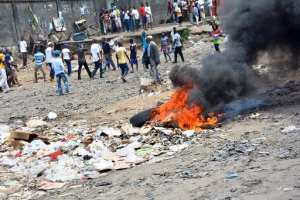
Kinshasa (AFP) - The Democratic Republic of Congo's lawmakers on Saturday agreed to scrap a contested part of an electoral bill that triggered days of deadly protests over claims it would have enabled President Joseph Kabila to extend his grip on power.
National Assembly speaker Aubin Minaku told AFP that MPs will withdraw a controversial provision from the planned legislation that required a census to be held before the next election in 2016.
The opposition, which had argued that such a census would take years to complete in the vast African nation and was a ploy to extend Kabila's time in office, cried victory at the climbdown, which came after some 40 people were killed in violent confrontations between protesters and police.
"This is a victory.... because there won't be (a delay) of the presidential election," Vital Kamerhe, head of the opposition Union for the Congolese Nation, told AFP.
Angry demonstrations erupted across the country after the National Assembly last week passed the original version of the electoral reform bill with the contested provision that many saw as an attempt by Kabila, in power for 14 years, to stay on past his mandate.
The New York-based Human Rights Watch said in a statement on Saturday that 36 people had died in protests in the capital Kinshasa this week, 21 of whom were fatally shot by security forces, while four were killed in the eastern city of Goma, about 1,500 kilometres (900 miles) from the capital.
The government, however, has put the death toll at 12.
The protests quickly spiralled out of control with security forces firing live bullets and tear gas at groups of protesters who hurled rocks and set fire to tyres and buildings. Shops were also looted.
- 'Lapses' -
After the deadly unrest, the Senate unanimously agreed to back down on the census provision on Friday, but the National Assembly had the final word on the matter.
The government had earlier acknowledged that the census could delay the elections.
The lower house of parliament is now expected to vote on the final text on Monday.
National Assembly speaker Minaku said there had been "no question of violating the constitution" and accused the opposition of fomenting the unrest in the impoverished nation.
But he also admitted that mistakes were made in the crackdown on the protests.
"Never again will we allow police to fire live bullets on demonstrators, students or others in DR Congo," Aubin Minaku, the speaker of the country's National Assembly, said in a tweet.
"There was a lapse, no supposed authority can give an order to fire on its people," he said, a sentence that was deleted from his Twitter account a short while later.
Kabila, now 43, came to power in January 2001 when politicians rushed to make the young soldier head of state after the assassination of his father, rebel-turned-president Laurent Kabila.
The unrest over the bill is the latest upheaval to rock the former Zaire, which has been plagued by wars at a cost of millions of lives and weakened by decades of misrule.
Many African presidents have tried, and often succeeded, to stay in power by rewriting their countries' constitutions to get rid of limits on presidential terms.
Last year, Burkina Faso's president Blaise Compaore was chased from power when he tried to change the constitution to extend his 27-year rule.




 We’ll no longer tolerate your empty, unwarranted attacks – TUC blasts Prof Adei
We’ll no longer tolerate your empty, unwarranted attacks – TUC blasts Prof Adei
 Bawumia donates GHc200,000 to support Madina fire victims
Bawumia donates GHc200,000 to support Madina fire victims
 IMF to disburse US$360million third tranche to Ghana without creditors MoU
IMF to disburse US$360million third tranche to Ghana without creditors MoU
 Truck owner share insights into train collision incident
Truck owner share insights into train collision incident
 Paramount chief of Bassare Traditional Area passes on
Paramount chief of Bassare Traditional Area passes on
 Two teachers in court over alleged illegal possession of BECE papers
Two teachers in court over alleged illegal possession of BECE papers
 Sunyani: Victim allegedly shot by traditional warriors appeals for justice
Sunyani: Victim allegedly shot by traditional warriors appeals for justice
 Mahama vows to scrap teacher licensure exams, review Free SHS policy
Mahama vows to scrap teacher licensure exams, review Free SHS policy
 Government will replace burnt Madina shops with a new three-story, 120-store fac...
Government will replace burnt Madina shops with a new three-story, 120-store fac...
